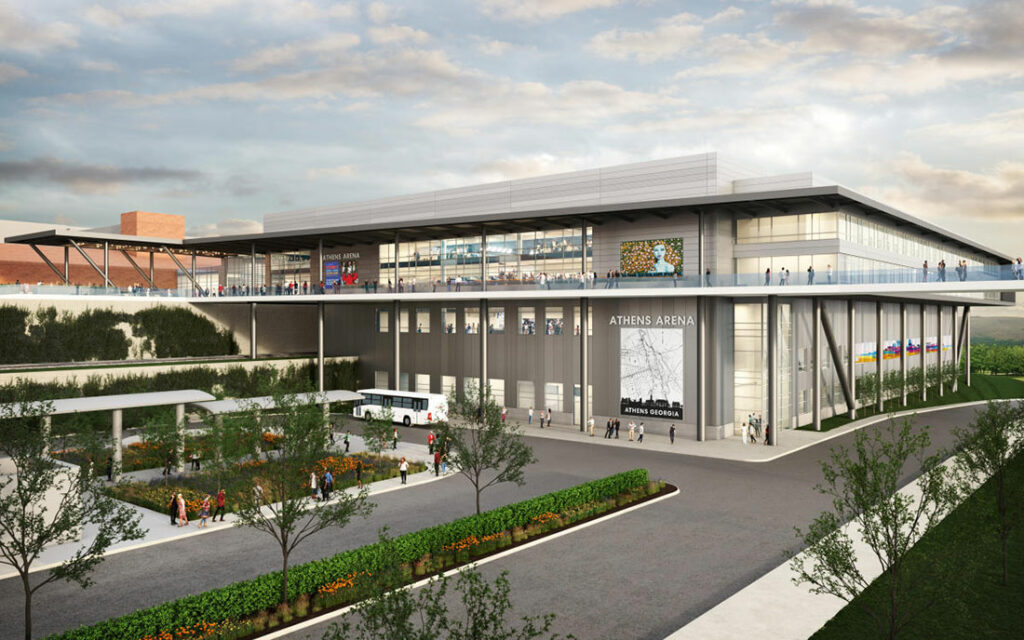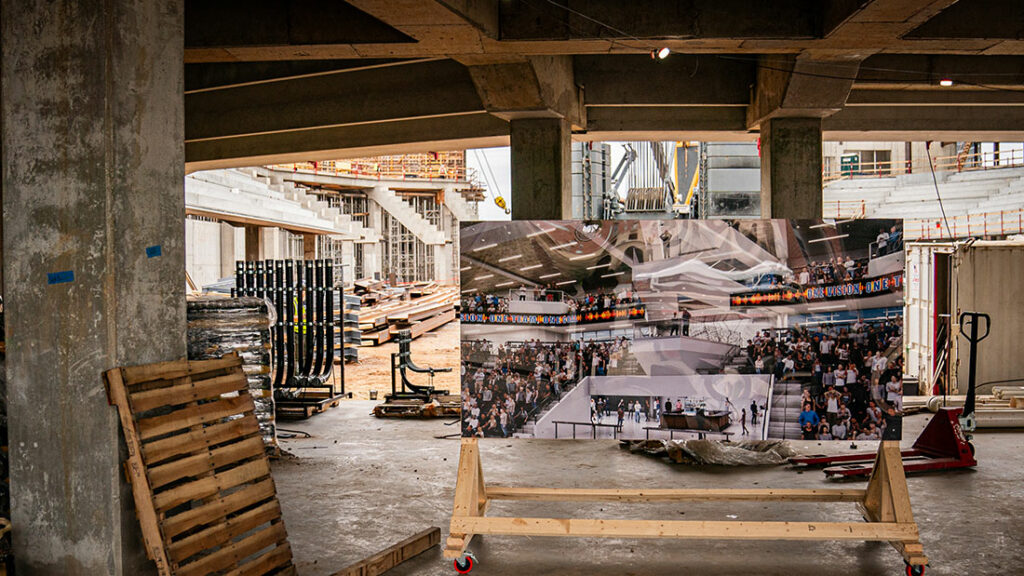After more than five years and countless setbacks, the new arena at the Classic Center is quickly rising above the steep slope from downtown Athens to the North Oconee River.
Construction on the arena “topped out” last month, meaning the basic steel-and-cement structure is now in place, and all that’s left is to add the exterior walls and finish the interior. By the time school starts next fall, the arena should be hosting concerts, sporting events, large convention gatherings and more. But the impact on downtown will be even greater—new apartments, condos, hotels, a parking deck and an entertainment district with retail shops, restaurants and a food hall like Atlanta’s Ponce City Market are planned to sprout up around the arena, fulfilling a long-held vision to extend downtown toward the river.
“The more people you have living downtown, it’ll help the restaurants, the shops and other things,” Classic Center Executive Director Paul Cramer said.
Cramer and other local tourism officials led a tour of the construction site last month, primarily for event planners, but invited Flagpole to tag along. The arena’s basic configuration will have 5,500 seats, but can expand to 6,500 for concerts and 8,500 for conventions. It will include 35 concession stands, 18 luxury suites and a “club area” where patrons can purchase tables. Fans will be able to view games and concerts from a concourse above the bowl, where items from the Georgia Music Hall of Fame—currently in storage at UGA’s special collections library after the physical hall in Macon closed in 2011—will be displayed, along with work by local artists.

“We’re trying to bring in Athens culture and Athens history, and bring what’s special about Athens into that arena,” said Katherine Puckett, the Classic Center’s director of sales.
Salespeople are already booking events for next year, including a gymnastics tournament and the Harlem Globetrotters. UGA’s club ice hockey teams will play home games at the arena, and so will an expansion minor-league hockey team with the ECHL. One advantage of the arena over the Classic Center’s existing Grand Hall, which has a machine to ice over the floor for hockey and skating, is a quicker turnaround time, according to Cramer. It takes three days to set up the Grand Hall’s bleachers and two days to take them down. With an arena, “you can go from concerts to hockey to dance to cheerleaders overnight,” he said.
All in all, the arena is expected to host 25 concerts, 10 family events, 55 sporting events, 20 community events and 10 conventions a year. An economic impact study found that the arena would generate $33 million for the local economy annually and create 600 jobs. At Athens-Clarke County commissioners’ insistence, arena jobs’ minimum wage will be dictated by MIT’s Living Wage Calculator, which currently pegs the figure at $16.29 an hour for a single adult.

Those jobs come at a cost, though. Since it was first proposed in 2018, the cost has doubled from $75 million to $151 million. However, taxpayers are bearing less than a quarter of the expense.
When putting together projects for the SPLOST 2020 sales tax referendum, a citizens advisory committee balked at what was then an $88 million price tag and left the arena off its proposed list. The ACC Commission put it back on, but reduced funding to $34 million. Although detractors threatened to torpedo the SPLOST vote if the arena was included, the package passed with more than 70% of the vote.
Since then, supply-chain issues and interest rate hikes have driven up the cost of building just about anything, and workers found more rock and contaminated soil to remove than anticipated. At one point, the master developer, Atlanta-based Mallory & Evans, pulled out, but shortly after recommitted to the project. Several times, Cramer has had to come back to the commission for approval of what eventually became a complicated financial mechanism involving bond issues, parking revenue, naming rights, ticket surcharges, contributions from vendors, land leases, a special tax district and other funding sources—but no additional tax dollars from Athens residents. Most recently, the ACC Commission awarded a $3 million contract for construction of a bridge and stairs leading up to the arena from Hickory Street.
The concept of a sports facility surrounded by a brand-new commercial and residential district brings to mind a mini version of the Atlanta Braves’ Truist Park and The Battery, but Mayor Kelly Girtz compares it to Savannah’s 9,500-seat Enmarket Arena, noting that they are about the same size and were designed by the same architectural firm, Perkins & Will.
“If you look at the Savannah programming over the last two years since their arena has been open, you probably get some idea of what you’ll end up seeing here in Athens,” Girtz told student journalists with Grady NewsSource at a Dec. 1 press conference. Upcoming events at Enmarket Arena include Ghost Pirates minor-league hockey games, a college basketball tournament, Disney’s Frozen and Encanto on ice, comedian Jim Gaffigan, and concerts by Jason Aldean and Keith Sweat, among others.
Such events are too large for other venues in Athens—the Classic Center Theatre seats 2,000, its Grand Hall holds up to 6,000 people in a standing-room-only configuration, and the Georgia Theatre has a capacity of 1,000. According to the economic impact study, the arena is expected to draw visitors from a radius ranging from metro Atlanta to Greenville, SC and as far away as Charlotte. Where will they all park? Downtown hotels and thousands of residences are within walking distance, the Multimodal Transportation Center is next door, and the Greenway and Firefly Trail are a block away. A 1,200-space parking deck is also under construction, adding to downtown’s four decks, plus several others on the UGA campus that are open to the public after-hours.
Like what you just read? Support Flagpole by making a donation today. Every dollar you give helps fund our ongoing mission to provide Athens with quality, independent journalism.










